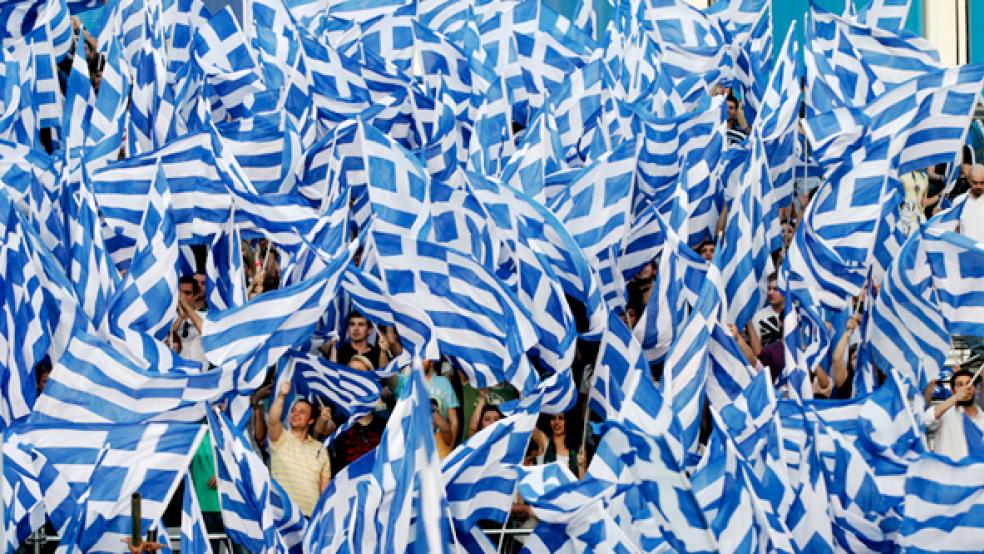Socialist leader Evangelos Venizelos began a last-gasp attempt to form a government on Thursday, but Greece seemed to be moving inexorably towards new elections after voters rejected an international bailout, plunging the country into crisis. Venizelos is the third and last political leader to attempt to form a government after Sunday's election, which left pro- and anti-bailout forces balanced almost equally.
Venizelos acknowledged he only had a slim chance in remarks to his parliamentary group, reduced to about a quarter of its former strength by elections in which voters punished his party and conservative New Democracy for imposing harsh austerity in exchange for a 130-billion-euro ($168-billion) EU/IMF bailout. He said he would make every effort to form a coalition, or if not at least help the president try to find a unity government. That would be the last stage before new elections are called in three or four weeks.

Venizelos received a three-day mandate after radical Leftist Coalition leader Alexis Tsipras formally gave up his attempt, telling President Karolos Papoulias: "We did everything possible to form a government compatible with the popular vote, but that was not possible." New Democracy leader Antonis Samaras, who finished first in the election, surrendered his effort within hours of receiving the first mandate on Monday.
RELATED: Why the Greek Bailout Won't Work in the Long Run
As political efforts hit deadlock, new data underlined the depth of Greece's five-year recession, one of the worst in post-war Europe. The jobless rate hit a new record in February, showing one in five Greeks and one in two young people were out of work. Young people are thought to have been a major component of the Left Coalition's success in the election, which took its vote from 5 percent in 2009 to nearly 17 percent, dislodging once mighty PASOK as the second party.
EUROPEAN WARNINGS
The deadlock prompted a stream of warnings by European leaders that Greece would be thrown out of the euro if it did not stick to the terms of the bailout, which is the only thing keeping it from bankruptcy. Impatient European governments withheld part of the latest tranche of rescue funds to be paid to Greece on Thursday, apparently to tighten the screws on Athens.
"We do not have an infinite amount of time. Time is flying because there are financing needs, but the first steps have to be taken now from the Greek side," European Central Bank governing council member Ewald Nowotny said in Vienna.
So widespread is the pessimism that British bookmaker Ladbrokes has suspended betting on Greece leaving the euro zone by the end of the year.
There is deep uncertainty over what Greeks would do in a second election. Many say they would stick to their guns despite the European threats, but there is a chance some would move back to mainstream parties because of fears of a euro exit. "I have no regrets. I feel vindicated because the two pro-bailout parties have been unfair with us for so many years," said 70-year-old Petros Chiotopoulos.
The great majority of Greeks want to stay in the euro, but most also voted against the austerity measures which are the price for that, creating a conundrum which may be impossible to resolve even after a second poll. "We want to stay in the euro. We want to be on an equal footing with other people and not just slaves of some countries," said public sector worker Dimitris Nasis, 62.
There seems little ground for compromise between the pro- and anti-bailout parties, split almost down the middle in the new parliament, leaving even a presidential unity government with few chances of success.
Even if a government can be formed, it is likely to last only a few months because of the diametrically opposed views of the major political groups.
Tsipras had demanded that New Democracy and PASOK, which have ruled Greece for decades, tear up the pledges they made in return for the bailout. They rejected this out of hand.
Angela Merkel, leader of euro zone paymaster Germany, said in a newspaper interview that she wanted Greece to stay in the common currency but it must stick to the terms of the bailout. A senior lawmaker in her coalition said a disorderly Greek default would be less worrying now than it was a few months ago because the European Union is better prepared.
Many Greeks seemed unfazed by the crisis created by the election, with conservative daily Kathimerini writing in an editorial: "Greeks have lived through more than two years of constant fear and threats about what may be around the corner. It may be that they're immune to it now.
Greece's turmoil, and the prospect that it could revive the euro zone debt crisis, have rattled global markets, pushing down shares and the euro.
($1 = 0.7733 euros)
(Additional reporting by Karolina Tagaris, Renee Maltezou, Tatiana Fragou, Dina Kyriakidou and George Georgiopoulos)

